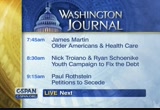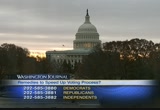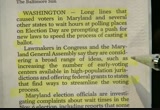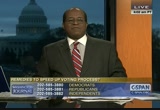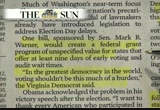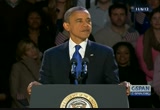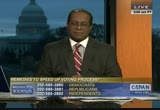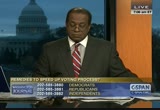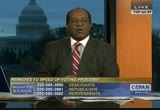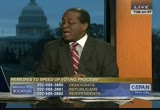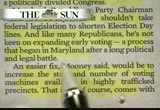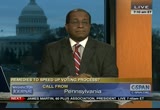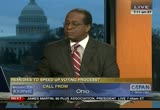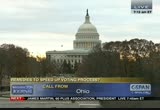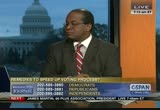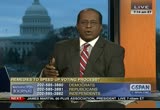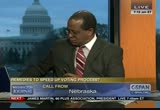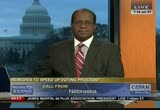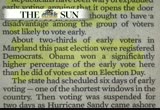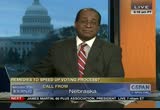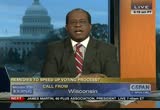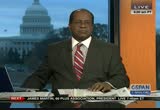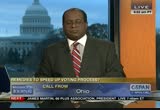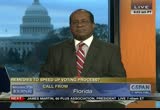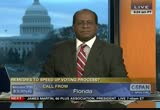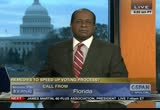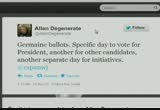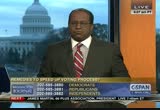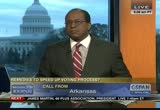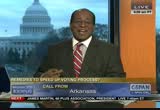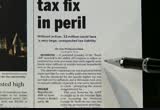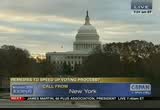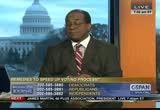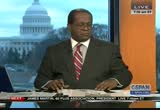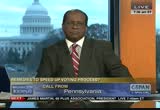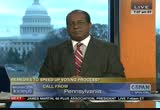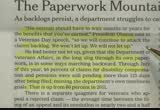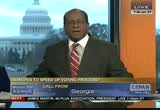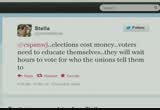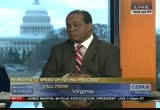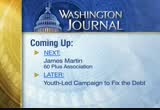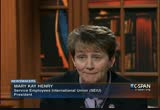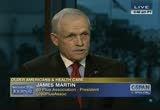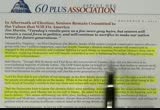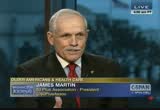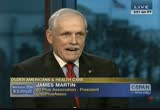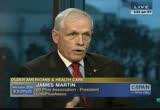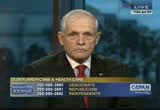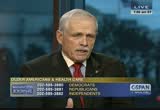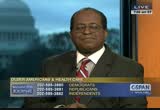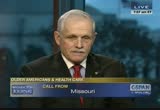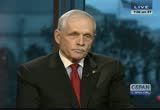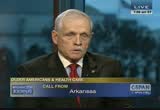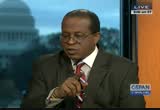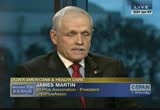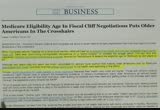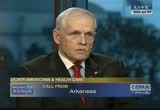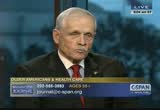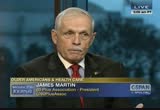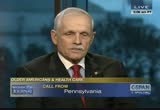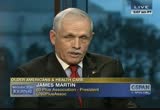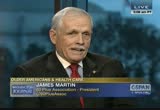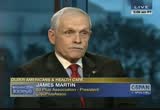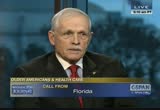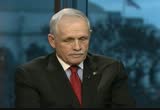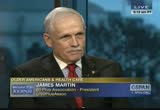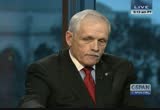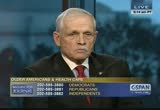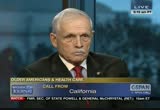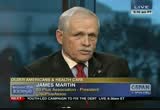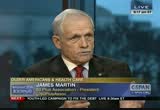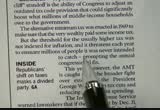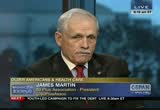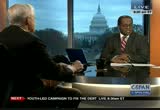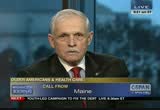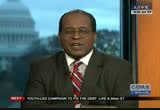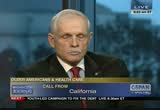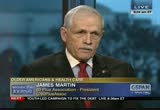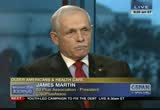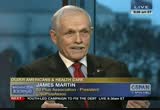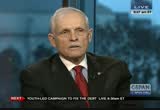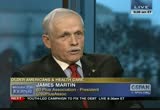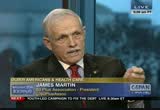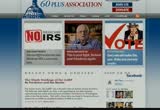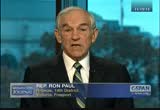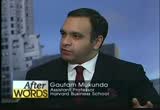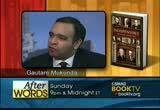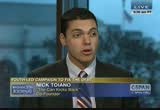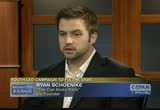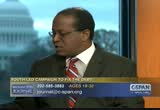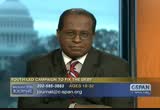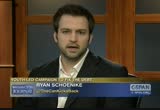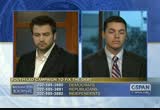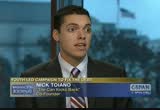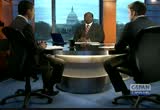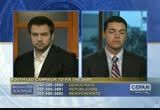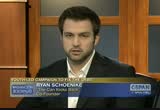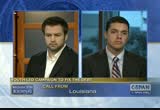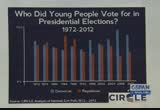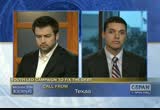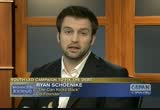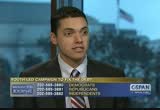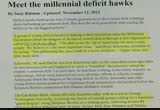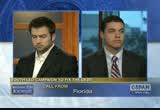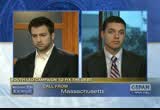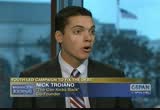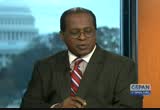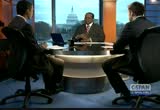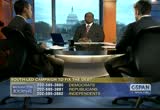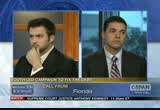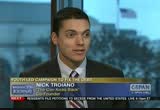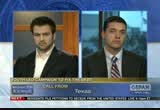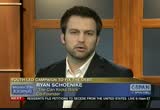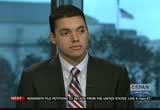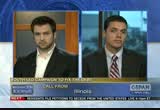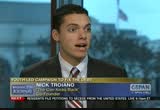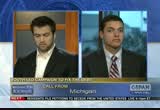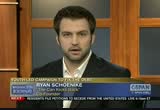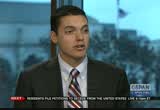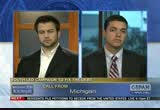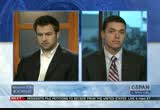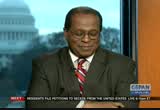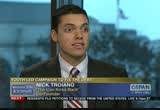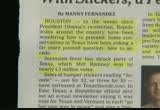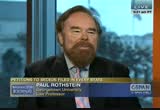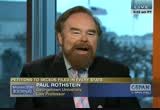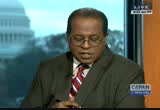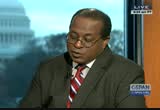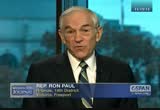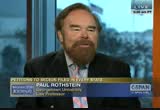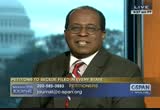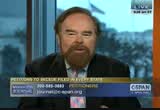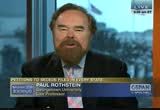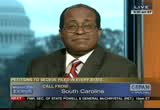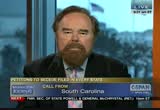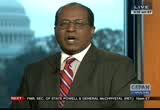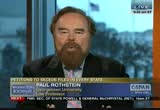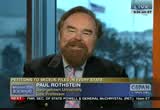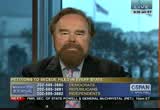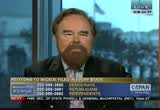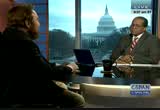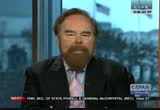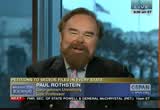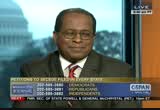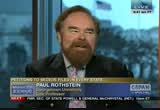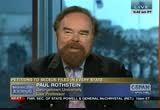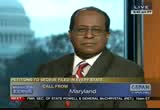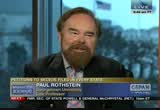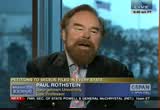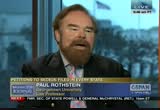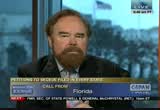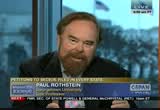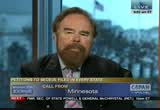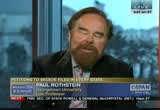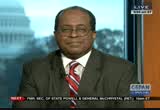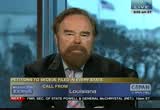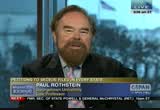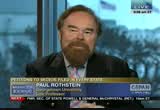tv Washington Journal CSPAN November 24, 2012 7:00am-10:00am EST
7:00 am
residents in every state to secede from the united states. a georgetown university law professor is our guest. "washington journal" is next. host: federal officials including lawmakers on capitol hill are looking at how to slash wait times and possibly boost early voting. that will be hours subject for the first section of this edition of "the washington journal." for the first 45 minutes we will be talking to you about remedies to speed up the voting process. the numbers are on the screen.
7:01 am
7:02 am
7:03 am
7:04 am
we would like to show you a little bit more about what the president had to say regarding voting lines and polling places. his thinking people and appreciating the time they had to wait in line to vote. [video clip] >> i want to thank every american who participated in this election. [applause] whether you voted for the very
7:05 am
first time -- [cheers and applause] -- or waited in long for a very long time -- by the way, we have to fix that. host: we are talking about remedies to speed up the voting process. the first call comes from michael in oregon on the line for democrats. caller: we have a very simple process here. they send us -- we get a letter in the mail. it says who we have to vote for and we send it back in. host: so there is no waiting in line? caller: none. host: do you feel like that is the best way to go? caller: i think it is great.
7:06 am
all you have to do is register. make sure that your address is registered. they send you a ballot in the mail and you send it back in. host: our next call comes from larry on the line for independent. give me a remedy to speed of the voting process. caller: i think we could probably moved it to veterans day -- november 11. a couple of days around it. three days of voting, kind of like a national holiday. the other way i think is, i really like what the republicans are doing with the voter suppression. that will take care of lines of immediately.
7:07 am
you have a couple of good choices. with logic and region -- reason you should be able to figure out which is the better one. host: next up is the line for democrats. go ahead, theresa. turn down your television, ok? caller: i was thinking because of the wave of the future in technology today that perhaps they may have online voting in the future. have a particular app just for voting. host: how did you vote in the last election? caller: i waited until the traffic went down somewhat. i walk a little bit slower. i am 67. i had an injury. i walked slower now. host: when you got to your
7:08 am
polling place, was there a long line? did you have to wait a long time to vote? caller: i just waited for about 40 minutes. they had seats. i got to sit down and wait. host: to reset in california. let's move on to barry from massachusetts. caller: i think it is just pregnant women who were allowed to vote, that would speed up the process. then the big interest people could finance them or to them into -- somebody made them pregnant. it would have an influence. that would speed them up. host: we will leave it there. we have a tweet from somebody
7:09 am
7:10 am
back to the phones. ernest is calling on the independent line from philadelphia. caller: good morning. host: give me one of your remedies for speeding up the voting process. caller: i would like to speak about the independents and third-party is being included in debates. host: we are talking about the voting process itself. caller: right. what we can do is have more
7:11 am
polling places available for people to vote. host: did you vote until this election? caller: yes, for jill stein. host: how long did it take for you to vote? caller: about one hour. host: and you do not think that is too long? caller: no, because i wanted to send a message that we need to include independent and third- party. host: got it. let's move on to columbia station, ohio. caller: i agree with senator warner that we should extend the voting. here in ohio they tried to limit the voting, but it makes it harder for everyone. it is such an honor to vote and
7:12 am
a right to that we should make it as easy as possible. do not be afraid of extending the vote and having more people, more ideas vote. it should be your policies. -- your policies that win, not just trying to get it to your liking. host: your calling on the line for republicans. we have a tweet from bill king. he says in states where republicans have control of the state house and legislature, they are making it more difficult than not simpler to vote. caller: that is my point. it tor blackmun saimade vote. i do not agree with what is
7:13 am
going on. host: do you think making it easier to vote would cause an advantage for one party over the other? caller: if it does, it does. how many times has ohio voted read it? many times. it should be your ideas and your policies. if we voted democratic, then obviously the policies are better. if we vote republican, the policies are better. that should be what decides how many shows up. people in ohio vote for what they believe in. host: let's move on to juliana from delaware. caller: good morning. i am calling in to say that perhaps there should be more polling places available to the voters.
7:14 am
we barely have any waits here in new castle county. i am talking about maybe a 10 minute wait. we have several voting places available. it might be desirable to have more early voting available to states that have long lines and also to send out sample ballots ahead of time to people. host: do they have early voting in delaware? caller: know, only absentee ballots are early. host: and you went to the polling place in wilmington? caller: yes, it is about one block and a half away from me. i worked at the polls. i have been working there for seven years. host: over the last seven years, what has changed their in
7:15 am
wilmington if anything regarding the way voters come in or the way they are handled or the way you all keep things moving? it sounds like things are moving pretty well. caller: nothing really has changed. we have been consistent in the way we have been doing things. the process for the primaries is a little different than the general election. we have to announce the party for the primary election, but we do not have to announce the party for the general election. i am very proud of it. host: justin is the next caller from omaha, nebraska. caller: i do not really have a solution to speed of the voting process. i can only speak to how it works here for me personally.
7:16 am
i live in douglas county. it borders the river. personally, i have never had any problems. i went up to where i went to grade school. the population here is not like it is in places like ohio. i had a theory that some of this is just -- like i said, i have never had a problem voting. what i do want to address is, both of these -- to both of these parties have spent billions of dollars for an elected position that only pays them $500,000 annually. like i said, i have not seen a problem with the voting process. right across the river in iowa, the early vote a lot. a friend of mine early votes every election. i have never had a problem voting absentee when i was in the service. i have never had trouble voting here in my home town.
7:17 am
from a personal point of view, i do not have a problem with the polling process. i have an issue that the republican party seems fractured. the democratic party, like them or hate them, they are organized. the republicans need to figure out what is going on. i see marco rubio running in the near future. host: let me get your thoughts on this article we are reading. it says republicans have been wary of expanded early voting saying it opens the door to fraud. imy question to you is, do you
7:18 am
think there is an advantage gained by either party, the democrats are the republicans, by having early voting? caller: it kinda depends on the oversight. i have never early voted. it is funny you mention barack obama carried the state that you mentioned. i am not sure on the isle of statistics -- it is an important state. she voted twice for president obama. she voted early each time. i do not know where early votes go after that. i could see a little bit of potential for fraud, kind of like the american idol voting. technology might get to the point where we do not need to go anywhere to vote. we will do it on the phone or the computer. that could open the door way to fraud, people voting more than once. somebody early voting and going
7:19 am
to the polls. it depends on oversight. host: we are going to leave it there and move on to ron on the line for democrats. caller: good morning. the problem is the republicans. they can only win with a minority. to do this, they have to divide the electorate somehow. they do this through religion, they do this through race, they do this through money, actually. people who have money are able to have more in this country. they can only win through obstruction and limiting the number of people voting. in the future, we have to look into this. i think everybody in the country who is able to vote should vote. but you cannot put obstructions in their way.
7:20 am
host: you are talking about obstructions. in the article we are reading from, and they write -- are you convinced in wisconsin they are doing everything that they can to make sure that the voters are properly identified without suppressing voter turnout? caller: i look at the situation here in wisconsin as a deliberate blocking of voters. this is the only way they can possibly win is to limit the number of voters. they have to keep the number low. that is why they have done
7:21 am
everything as far as putting up these laws to prevent people from voting. in wisconsin they tried to limit the vote. thank goodness people open their eyes and time to see what happened. thank you, and have a really good weekend. host:in "the philadelphia enquirer," we will take a look at other stories in the news. the lead story this morning --
7:22 am
we continue the discussion regarding remedies to speeding up the voting process. the next call comes from laurie in ohio on the line for independents. caller: this time i voted democrat. the last two presidential elections i voted early ballot. i think it is a wonderful thing that people have the right to
7:23 am
put in an early ballot. i think a lot of people should with their businesses requiring them to work so many hours. a lot of them use it as an excuse with the long lines to not be able to vote when they obviously have the right to vote and the means to vote. aost: let's move onto linda, republican. caller: i have not been able to call since last december. i am a big fan. host: we are glad you got through today and you kept trying. what are some remedies to speed up the voting process? talk to me about your voting process. florida took a long time to get their numbers and. caller: it did.
7:24 am
it was not that i tried to call, i have been sick and not been able to. i want to say one thing -- c- span has improved so much by asking people to give their zip codes. this keeps serial collars limited. the one recommendation i really want c-span to be diligent about his keeping callers on the question. they will call in and want to answer their own agenda or whatever. please try to retarget them back the question is.e first of all, i do not think we need to speed up the voting process. i think we need to make it better. i am not a real big fan of early voting except for people
7:25 am
disabled or in the military. i think it does increase the chance for fraud. host: how would you make it better? caller: i confess i do not have the answers, but there are many states like massachusetts that do not have early voting at all. would you look at the end of the election and look at the problems, they did not have really very many problems in their state. there are other states like that as well. host: did you have any problems loading in casselberry, florida? caller: the line was the longest i had ever experienced it. i have never early voted, and i did not this year either. the line was about 45 minutes, which is extraordinary. i have never had anything like that before. what they reported in the news after the election is one of the big reasons in florida when they
7:26 am
7:27 am
those are the remedies that allen sends us regarding speeding up the process. the next call comes from ida in alabama. go ahead. are you there? all right. we will move on to jim from massachusetts on the line for independents. caller: good morning. a great question. we need to assure we eliminate fraudulent voting. i think it is far more important that we have a fair, fraud of free process that a quick process. i had a 10 minute vote here. even in massachusetts, we hire enough staff. frankly, if you eliminate the fraud, you will make it a little
7:28 am
bit faster because the people who are not supposed to be voting are voting multiple times will not show up. host: where is oster bill, massachusetts? caller: cape cod. host: is it a smaller caller:: yes. i know the person checking us in, but i brought the idea anyway. i think that is important. host: how long was your way time? caller: a full six minutes. it was terrible. host: thank you, jim. next up is charlie from arkansas. you are on "the washington journal." caller: thank you for taking my call. we do not have a problem is around here. i am against early voting because that is where the crime comes in.
7:29 am
imagine this. you take people to early vote, you buy their dinner before after or use look them $50. you are asking for fraud. -- you slipped them $50. if you want to speed elections up, have more polling precincts. host: how long did you have to wait a in of dover, arkansas? caller: there was no problem voting. arkansas has agreed to voting process. the only problem we are having now is the new computers and new machines and -- if you do not vote with a paper ballot there is no way to recount some of them. host: do they have early voting in arkansas? caller: they do. i guarantee if you have a sheriff's race, you will be getting a chicken dinner before the election once you go to vote.
7:30 am
7:31 am
7:32 am
i was thinking that they could probably contract those companies and set up a federal standard for the local id's. they could vote at an atm machine. host: would it be over one week 's. of time? would you have early voting? caller: i would not think you would need it because there are so many machines nationwide. i think you could use them -- you would not necessarily need to be in your home district to do it, either. host: so you go to a local atm and slip in your card and get your $20 and make a vote? caller: there you go. i think there is one other thing the -- actually, you're sorry sorry. i lost my train of thought. host: if you think about it in the next 30 days, give us a call back. michael, your remedy to speed up
7:33 am
the voting process? caller: i am amazed that all the different comments and the issues that are associated with basically voter fraud, our ability to vote early. we are all issued a social security number of votes -- at the birth. that tracks us up until death. when we think about adding automation to that and to be able to track the social security number -- every american has a fund. why cannot vote using the technology there today? when a person becomes legal voting age, each state should issue that individual a state id. that would solve the fraud. that would sell accessibility. it would not matter early voting or not because it is attached to a number. host: we will leave it there. a couple of stories regarding the situation in egypt. the lead story in "the
7:35 am
back to the phones with our discussion for remedies to speed up the voting process. cathy, you are on "the washington journal." del ahead. caller: we have a vote by mail here. it is wonderful. we do not have problems. i am a little bit surprised a many people in the eastern part of the united states think there is so much fraud. we really do not have that much of a problem here. we always have a paper ballot to recount. host: our next call comes from jane in philadelphia on the line for republicans. caller: the story a minority
7:36 am
inspector at the polls. -- i am a minority inspector at the polls. i think the only way to fix the problem is with an id. i had a van pulled up and ask them to see if they were in the book. they were not. they handed me a voter registration card. it looked strange to me. it was stamped from the city of philadelphia. the address said south spruce street. i know it runs east to west. it also had a wrong the number address. the street only goes to 250 and it went to 261. host: what is the process there? caller: i have no idea. i called city hall. they had no name of that voter.
7:37 am
i tell the voters he was not allowed to vote of my polling system. he then threatened me and said he would come after me. he had people waiting outside of the before me. it was a very frightening situation. fortunately, a voter who was there with me came to my defense. i called city hall and they said, we would never issue anything like that. there was an official stamp. i also called the district attorney's office. they never called me back. i called and called again. this is our right fraud. if you just had a voter i.d.. the lines are enormous. i have to check the spelling of their name, i have to look up everything. it is so much easier and nicer for us as a worker. i was there for 14 hours that day with a half hour lunch. i was so happy to have somebody give me an idea.
7:38 am
it made the process so much better. host: how many different types of ids are acceptable? caller: anything. student identification, anything with a name. i said, to you have anything else with the address of their. he said i do not have to share your id. i knew these people did not live in my neighborhood. i have lived there since 2006. i know almost everybody in my neighborhood. this was issued by the city of philadelphia, outright fraud. host: a couple more stories we are looking at this morning as we continue the discussion on remedies to speed of the voting process. this has to deal with the soldiers sailors, marines who have served it. jobs crisis for national guard soldiers.
7:39 am
7:40 am
7:41 am
7:42 am
arthur is on the line for democrats from new york. caller: thank you for taking my call. host: talk to me about some remedies for speeding up the voting process. caller: my idea is, you already have social security numbers. people will go register to vote and put down their party. link the social security number to the party. then the only people you have read the polls who decide to change the party or the person who is in the party. host: all right. we will go with that. we want to talk to you about an item in "the washington post" this morning. surely, you have seen all the headlines regarding black friday. an economic columnist in "the
7:43 am
7:44 am
that, i would go along with a gentleman talking about the social security number, relating that to your name and different things. the social security administration holds the no.. that should cut down on fraud. it could be done electronically or with paper work. host: we want to thank everybody who called in to participate about the discussion regarding remedies to speed up the voting process. coming up on "the washington journal," two groups representing two different generations will be giving their take on the looming debt crisis. first up, the 60 plus association representing older generation.
7:45 am
first, we want to let you know what is coming up on "newsmakers" this week, a conversation with mary kay henry. she was a labor leader who went to the white house recently as the president talked with labor leaders about the fiscal cliff. this is what she had to say in her interview. [video clip] >> what are the top items, a minimum wage, immigration? what's the biggest thing we think has to happen is comprehensive immigration reform. we think there needs to be a core set of economic issues that we are developing now including the minimum wage that actually cements in restoring the american middle-class. we are not yet on that path. we agree with the president's vision.
7:46 am
the third thing, we have to fix voting in this country. people are mad. we are outraged about the lines. i do not know exactly what the prescription is, but that is a priority of the coalition we are a part of. >> did the president address the other big-ticket items? >> he made it clear that when we get through the tax and job discussion in the congress he was to prioritize comprehensive immigration reform. he sees it as a key part to stabilizing the economy, investing in the middle class, not having a subclass of 11 million people that hurt economic revitalization. for him i think it is a piece of the middle class agenda. >> are the other unions working with senator schuman who say they are starting to work on a piece of legislation?
7:47 am
>> the majority leader and center schumer. we have some issues with this idea, but we applaud his enthusiasm. we are trying to get him on the steps of key elements that are important to us. >> where do you disagree? >> i think he thinks a national id card is required. we do nothing that needs to be part of the solution to fixing the broken immigration system. >> washington journal continues. host:jim martin n. he will be talking about the future of health care, especially the elements of the affordable care act that are put to place. guest: glad to be here. host: what does it mean in
7:48 am
general for older americans now that the election is over? guest: i think things like obamacare, the affordable care act, seniors were opposed to it before it passed, there are still adamantly opposed to it. it has some good things and bad things and it. host: give us two were three things you think are bad for seniors. guest: first, the $716 billion worth of cuts from medicare. senior citizens, they like to say they have paid into the system all in their adult life. but the fact is, you cut $716 billion out of medicare, you add a 30 million new customers, you have 10,000 baby boomers retire in daily. the numbers do add up. i think senior is backedin
7:49 am
2009, senior citizens were opposed to the bill back then. people were talking about who had read it and who had not read it. the speaker of the house of the times said, we have to pass it to see what is in it. i think seniors were the only ones to read it. this of the cuts on the horizon. i think we're going to start seeing rationing if we are not already. host: in a news release put out by the 60 plus association after the election, you are quoted as saying --
7:50 am
talk to me about the plans. what is it you want to do in the days of the lame-duck part of congress. is there anything you can do? will you be lobbying members of congress, some of whom may not of backedin january? guest: besides health care, you touched on a couple of things. energy independence. high energy costs impact seniors more than any other segment in society. we have said we need to develop our own domestic energy sources. i read recently where the united states will surpass saudi arabia in oil production in a few more years. we have so many energy resources at our disposal, shale energy.
7:51 am
fracking up in pennsylvania, new york, north dakota. hydraulic fracking has been around 55 or 60 years, but it has been too expensive. with new technologies, a can and does produce oil and natural gas. we have it would hundred year supply of natural gas. our over dependence on oil resources from unfriendly nations, we call that a clear and present danger to the national security. we think it is a clear and present danger to the economic security. we have to bring down the cost of energy. on top of that, the taxes during the fiscal clef. tax's impact seniors more than any segment. there is a tax called the estate tax. we call it the death tax.
7:52 am
a lot of seniors are impacted by that. we are keeping an eye on that and we will be watching closely in the lame duck session. many things impacting seniors. clearly, high cost of energy, high taxes, medicare as we know it needs to be fixed. host: we are talking about the economy and older americans, particularly health care, with jim martin. if you would like to get involved, by all means give us a call. if you also want to get in touch with us with social media, twitter is @cspanwj.
7:53 am
before we get to the first call , tell us exactly what is the 60 plus association. you for asking that. i started this 20 years ago. quite frankly, i have been in this town almost 50 years coming here as a newspaper reporter when john f. kennedy was in the white house. little did i know that most seniors in the 50 states, the older we get, the little more moderate we get. i found out that the aarp comes from a fairly liberal viewpoint. i started 60 plus association as a counter. we have about 7 million senior
7:54 am
citizen activists. they have a 40 million. we're not trying to catch up, we are just trying to offer a an alternative viewpoint. we make it clear we come from and a conservative viewpoint. one major difference between us and the aarp -- they are selling a lot of products through the mail and we are selling a philosophy. host: our first call comes from paul from international falls, minn. on the line for democrats. caller: i would like to ask this gentleman -- i am sure he is talking the republican line. in doing so, he is saying that the $760 billion taken out of medicare was taken away from the seniors. he knows it was used to
7:55 am
strengthen medicare and make it longer and give them a little bit better benefits. taking away from the insurance companies because it's from profits given to medicare. i would appreciate his answer on that. thank you. guest: yes, i am republican. i made no bones about that. it sounds like paul was talking the democratic line on the other line. it is a matter of opinion. quite frankly, when i talk to cuts to medicare, some people say their savings. it is a lower rate of return. that is the semantic cesspool we deal with in washington, d.c. people say they are savings. the fact is, even nancy pelosi started referring to it as, yes, we cut over $500 million out of
7:56 am
medicare. there will be less care for seniors. less care -- quite frankly, there is a survey showing that if you turn more and more to nurse practitioners as the doctor shortage becomes much more huge, you're going to have less care. heart attack patience for example do not survive as well when they are handled by a nurse practitioners instead of doctors. host: i want to let our viewers know that we do have a special line for people 55 and older. 585-3833. that is for callers and viewers over the age of 55. the next call from missouri. he is on the line for democrats.
7:57 am
caller: let me first point out that i am a democrat. i am away over 65. i would be interested in the -- it is almost evident now how much the pharmaceutical industry doenitz to your finances compared to the 7 million people you're talking about. also, it seems to me that people do not realize doctors and around the world have no place to escape to accept the united states. if we lose some of our local doctors, we will have englishmen, careens, germans -- is that not true? -- koreans. they get fixed incomes. the ones that have not dropped out, and they seem to be millionaires a run here where i live it. almost none of them are
7:58 am
millionaires in the other countries. how does that work out in your philosophy. guest: let me answer the question about the insurance industry and the pharmaceutical industry. they do not give me a nickel. if they want to give me money, i would be glad to take it. 10 or 12 years ago because we agreed with the pharmaceutical industry, they donated some money to us. the fact is, i think the caller from missouri, we ought to point out the pharmaceutical industry and the insurance industry are working hand in glove with the president on obamacare. everything from less expensive drugs from other countries, they agreed to stop those. we think that was not a good thing for senior citizens.
7:59 am
host: we are talking with jim martin from 60 plus association. we are talking about older aboutin the economy. if you want to find out more, there website is 60plus.org. we will take a another call from bill from little rock, arkansas who is 65 years old. caller: i am in pretty good health, but i go to a few doctors, some specialists for check ups. i did get medicare part a. when you go to these doctors now, i have two. i would like your comments. -- two points i would like your comments on. everyone is worried sick about
8:00 am
this obamacare thing. they are really worried they are not going to have time for us. they have all hired these advanced practical nurses, who are good people in very educated, but they are not the second thing i am worried about and have been is that any money i have saved over my life, it is getting no interest under this president. he was supposed to have fixed the economy. it is in the tank. i am not getting anything. those two things bother me as somebody who is 65. i cannot live on my insurance from anything i have made. i will keep working. god i have a good job. i would appreciate your comment. host: will you hold on?
8:01 am
i want to get mr. martin's comment. guest: i could not agree more with the caller and what he had to say. i am passed tire major. i am still working and playing -- paying taxes, obviously. the sustainable growth rate in 1997 started to hold down the cost of medicare. every year, congress has to address that particular problem. there are so many things the congress has to address. the caller is eligible for social security and medicare. the social security tax, they will end on january 1, 2013 unless they do something about it. we call it the social security tax holiday. data 2% away from what was
8:02 am
whatthey took -- they took 2% away from the social security trust fund. in 2010, it was the first time not enough money came in that was needed to pay out. there was always a surplus since the lbj day. s. they started putting it into the unified budget to mass of the overall deficit. the trust fund will run -- to mask the overall deficit. it was a nice tax breaks for low income seniors. that was stealing from that trust fund. we call it the social security fund. there is no trust in my estimation. host: this is from the huffy to post a business section.
8:03 am
earlier this week-- huffington post business section. older americans are in the cross hairs. when congress returns for a lame-duck session, stocks will keep up -- talks will heat up and there may be reinvigorated discussions on a grand bargain. the last time that happens, president obama considered a proposal favored by republicans to extend the eligibility for medicare to 67. as a guy who turned 65, your thoughts about extending the eligibility for medicaid to 67. guest: if you are younger, you are not thinking about it. i think it would be prudent to do that for the health of the
8:04 am
country in the future of the people. obviously, if you are at or near 65, you cannot do it. the thing i wonder is, as part of this whole situation, why is there no effort to really, really cut federal government spending. i do not understand why that is not on the table. you have to put page on the table. thank god for doctors. we are living longer and a lot of people are working longer. the retirement age for people who are younger can be extended gradually. just like it is. it was 66 for me as far as getting social security. i cannot understand why there is not more -- i work for the federal government. at the end of every fiscal year,
8:05 am
we have money left over. everybody gets a new desk and they get a new chair. we do not need a new desk. host: we will leave it there. go ahead, mr. martin. guest: we are talking about medicare being raised to 67. i would point out one other thing. i saw an interesting article by ezra klein in the washington post. he was quoting someone who was making $50 million or $20 million a year. the a set -- $15 million or $20 million per year. he does not need medicare. there are low income seniors. they are getting close to 65 and
8:06 am
they are saying, i am tired of working. i have been paying into medicare and social security all my life. i am looking forward to those medicare benefits. they do not have the financial wherewithal to withstand that change. i do not favor raising the age on medicare recipients. host: we are talking about health care and other economic issues for older americans, folks over the age of 60 with jim martin. he is the president of 60 plus association. we have a special line for those over the age of 65. 202-585-3883. our next call comes from charlie in pittsburgh on our line for republicans. caller: thank you for c-span and think you, mr. martin, for
8:07 am
having an organization for republican voters over the age of 60. my question is about tax reform. i am in the same position as other older americans. we get a pension, but it is not enough to live life more comfortably. you go out and find the job. that is what i did. my problem is they take your earnings and you made with your part-time job and at data on top of your retirement income. -- they add that on top of your retirement income. i would like to see your son to income tax at a different rate than your retirement income. i pay a marginal rates, a higher marginal rate on my earns income. your current income -- -- my earned income.
8:08 am
guest: something we have done at 60 plus, was an earnings limit imposed a year ago. we worked with members of congress to get that earnings limit raised. there is no limit on what seniors can earn. we called it a 33% tax and we lost $1 of every three of your social security benefits if you turned over a certain amount. a lot of kids did not want to go flip hamburgers at mcdonald's for $7.50 an hour. they were being penalized. in florida where i grew up, the chairman of the social security subcommittee, a republican who controlled the house in the mid- 1990s -- we were able to show that jobs were going begging. he had been in congress 20
8:09 am
something years. he came back and said, is the best thing i have ever done. he said a barber told him, i voted for you in the past. i may donate now. he said why? the barber said, i am 69 years old and i have been closing my barber shop. if i were passed on october 15, i go over the earnings limit and i am is losing 33%. i may as well go fishing because i am working for the government. a lot of his friends thought he was making a lot of money and that is why he had all of this leisure time. he said, now i can work year- round without the earnings limit. i can make more money and buy more gas for my grandchildren. i am 69 in i am so please. that is what we did years ago
8:10 am
working with members of congress. host: we have another senior citizen calling from tampa, florida. she is 73 years old. caller: and want to know why we are giving $460 million to egypt and all of these millions of dollars to countries and they are messing around with our social security. we worked for the social security. we put our money away and they took the interest. they need to stop giving to the u.n. -- other countries and give to americans first. i worked until i was 68 and then i could not work anymore. i can barely walk. i just live on my social security. i have only medicare. i cannot even afford supplements. people in america are starving and we are giving millions of
8:11 am
dollars to other countries. host: james martin, 16 plus. go ahead. guest: my favor a senior citizen, my mom, would have been 96 years old this week. she worked into her 80s and she depended largely on her social security check. not agree more with you. they have stolen from the trust fund for years and the years. i would like to quote two former senators. they held a news conference about 15 years ago and they said, if we did in private business what we do here in the congress, stealing from the trust fund for other purposes, that is called the embezzlement. you get locked up in private industry. congress has been doing that for years. seniors are paying into the fund and there is nothing to use now.
8:12 am
it should be stopped. host: we have a tweet. does mr. martin not understand the cuts to medicare are not to the basic program, but to medicare advantage and to providers, not us some of guest: absolutely. it is to providers and hospitals and those providers -- guest: absolutely. it is to providers. they are to hospitals and they have an impact. these are cuts. these are cut short and simple. when i was an old newspaper man, you could quote somebody
8:13 am
before video and next day in the paper, they can say they never said it. nancy pelosi said, we have cut more than $500 million out of medicare. it worked well in the past and still does. those cuts will affect medicare advantage. it has come in at a lower cost than traditional medicare. host: james martin is our guest. he is president of 60 plus association. he covered congress and the white house as a newspaper reporter and was a radio and television broadcaster for three dozen outlets in the south. he worked for the late edward j. greene. he helped organize and direct several advocacy groups
8:14 am
including the national conservative political action committee and the public service research council and also the americans against union control of government. he has a degree from the university of florida. back to the phones. arnold is calling us on the line for independents. caller: good morning. impressed with the fellow from arkansas who was willing to raise the eligibility for medicare. his job is to protect the union. he cannot lose his job. with seniors are 55, they will have a heck of a time getting medical insurance if they lose their jobs. that is something they should try to push back. eligibility to buy into medicare even if it does at a full rate -- -- it is at a full rates,
8:15 am
those are want to be the people who have trouble getting the insurance. they cannot find another one that will give them coverage. guest: i do not believe in raising the eligibility age for those in ready to go on medicare. host: our next call comes from wells in arkansas. -- will in arkansas. caller: the person who called in who worked for the government did not have a good opinion of government workers. he should quit his job if he does not like government. the gop believes in privatizing everything. if you look back in history, the social program started because people needed a safety net. they are not making a lot of money. these guys in the gop lost this
8:16 am
last election. they got there has served to them. we need to let the president go out here and do what he is going to do and stop trying to give corporations and private businesses all of the opportunities. if you look at the disparity between the past three decades between the rich and the middle class, it is deplorable. it is a shame. when the republicans ran government, they never did anything for a healthcare plan. host: will in oxnzrdard, california. guest: it is obvious where he is coming from. medicare and social security has helped bring a lot of seniors out of poverty. there are social security scare tactics used.
8:17 am
i call itmedi-scare. -- call it medi-scare. in 1996, the came forth with a plan to fix medicare. they know it is one to go broke. it is 10 or 12 years away from insolvency. even president obama's chief of staff said it may be only five years before it is insolvent. in 1996, the republicans came forth with a plan. they said this is an attempt to try to fix medicare to keep it viable and alive for future generations. the nancy pelosi of that day, richard gephardt said they are trying to dismantle social security and drive it over the cliff. the washington post is known as
8:18 am
a leftist-center paper. the washington post said dick bull.dt's charges were they said they are trying to attack republicans. half to come together and fix this problem. that was 1996 and we are 15 years closer to bankruptcy for medicare. we are trying to fix it for future retirees. host: earlier in the segment, one of the callers brought up the estate tax. in the charlotte observer this morning, when they addressed the topic of the fiscal cliff, they talk about the alternative minimum tax. it was enacted in 1969 to make sure the wealthy pay income tax. the threshold for the u higher tax -- tax was not
8:19 am
indexed for inflation. it was never intended to catch some people that it ensnares. this year, it is caught up in the broader fight over extending the present bush era tax cuts. the irs warned lawmakers and if they do not act by december 31, the number of people facing the amt would jump from 33 million to about 4 million who had to pay it this year. my question to you, mr. martin, if this situation is not rectified, what kind of effect is the amt to have on senior citizens? guest: the alternative minimum tax is only compacted -- impacting 160 people millions -- years ago and now it is impacting millions. a huge disparity.
8:20 am
the estate tax has a $5 million exemption. it will drop to $1 million and the tax will jump to 55% come january 1. this tax on estates, some people call that a rich man's tax. rich people do not pay it. ever heard of the buffet foundation or the dates foundation demo small businesses -- buffett foundation or the gate foundation? whoopie goldenberg of posits that tax -- whoopi goldberg opposes that tax. we do not think the first claimant in line should be on the salmon not even a blood
8:21 am
relative. host: we are discussing an older americans in america with james martin of the 60 plus association. what next caller is from maine. caller: i am 73 years old. i have been on medicare since i was 65. if i did not have it, i would probably be dead by now. the solution to the medicare problem is medicare for all. you have the young people in there, too. this is overall costs. i would like to ask mr. martin about cuts to medicare. my understanding was the some of those cuts to medicare were to stop subsidizing medicare advantage. in other words, stop subsidizing the insurance companies.
8:22 am
i certainly agree that raising the age for eligibility is not fair, especially for working people who work really hard and cannot keep going. they probably have a lot more problems with their health than those folks who sit at desks. guest: i agree with not raising the retirement age. the insurance lobby has been squeezed. 2% profits. they say we should cut down on that 2 percent profit margin. the with-2% profit margin. -- cut down on the person signed profit margin. -- 2% profit margin.
8:23 am
caller: good morning. i am is 79 years old and i am democrat. i want to correct a caller that called before. he said the money in the bank was not collecting anything. i work in a bag for over 45 years. my mother always taught me say -- i work in a bank for over 45 years. my mother always taught me to save a little for a rainy day. he says under the obama administration, we are not getting anything. i want to correct him. this has been going on for a long time during the bush administration, not the obama administration. i saved that money in order to having little nest egg. i knew i would not get that much
8:24 am
on social security. i wanted to correct that fellow. it did not happen under the obama administration. host: mr. martin, go ahead. guest: it has happened in previous administrations. host: calling from indianapolis indiana -- indianapolis, indiana. go ahead. caller: next month will be a question of whether to raise taxes on whom and by how much. do you see a compromise on this issue and taxes that should be put on the table and? more importantly, is there a proposal -- that should be put on the table? guest: i would like to see the death ta aboutx list.
8:25 am
that will not happen. -- the death ta aboutx list. that will not happen. -- death tax abolished. by the year 2016, it will be abolished. it was instituted three times before, a tax on the wealthy. in 1916, it stayed on the books. it is just like the tax on telephones in 1898 to finance the spanish-american war. why a tax on telephones? it was a tax on the rich. we have 300 million telephones or more. we have the federal excise tax
8:26 am
lifted. we say the same thing about the estate tax. it is not an income producer. most of the money that comes in is wasted on collection and compliance. the lawyers said the irs argued with the lawyers of the rightful owners. there is ample economic evidence that shows that tax should not be -- that tax should be abolished. if you leave it with the rifle owners, they will invest in new startup businesses, meaning more workers in the workplace. i would like to quote one liberal professor from the university of southern california. he said, i am and unrequited liberal. i used to think this tax was a tax we should keep. he said there are economic studies the show if you leave it with the rifle -- rightful h
8:27 am
eirs, it will produce revenue. host: we have a call from bill on the republican line. caller: the question i am concerned about is when are we going to get some interest of about our money will have on deposit? all i want to know is when are we going to get something for our people 65 and over who need money to live on? thank you. guest: not really sure where bill is coming from. host: jerry on our line for democrats. go ahead.
8:28 am
caller: i am not understanding some of the things you mentioned. republicans have fought hard not to tax oil companies. they have fought hard not to support alternative energy . . ryan would have cut even more. he was clear about that. the older population is probably be 47% that rummy spoke about. -- romne abouty. -- romney spoke about. guest: i have a daughter who
8:29 am
lives in fairbanks, alaska. my son-in-law is in the 101st airborne. she says, if it ever gets warm enough in alaska, you could walk around barefoot and oil would come up through your toes. we have an abundance of oil all over the united states. we need to develop our own resources and get out of the way of the oil industry and others. shale is a the new way to produce more energy. break away from the independent on foreign sources that may not always be friendly toward our country. 7 and $16 billion cuts in medicare -- $716 billion cuts in medicare -- mr. ryan came forth with a plan to save medicare.
8:30 am
that was a step in the right direction to save medicare for future retirees. in medicare as we know it occurred with the passage of the affordable care act two years ago because of the huge cuts to medicare. the independent payment advisory board, 15 eurocrats will make decisions based on cost and cost alone. the-bureaucrats -- bureaucrats who will make decisions on cost and cost alone. when we want to see 2/3 of congress agreeing on anything? host: mr. jim martin has been our guest. he is the president of 60 plus association.
8:31 am
if you want to get more information, you can go to the website, 60plus.org. coming up, the co-founders of the group, the can kicks back, will be here to discuss how the millennial generation sees the debt crisis. then we will talk about the secessionist in the united states. yesterday, first lady michelle obama and sasha and mali receivea to the white house christmas tree. -- malia receipt of the white house christmas tree. here is a little bit of what happened during the arrival. [video clip] >> the principle of secession being recognized.
8:32 am
there is no prohibition in the constitution against secession. they understood they were coming together. if they voluntarily come together, they can voluntarily leave whenever they want. they were protected by the 10th amendment. now people are saying, these people have to be put on a list. they are saying there should be a right of secession. they want to put them on a list that they are committing treason and be thrown out of the country. what about the first amendment? the principle of secession is important. not so much for the purpose of seceding, but by saying to the federal government, if you mystery to us, that is what we might consider. >> i can remember barack obama's speech in 2004. that rhetorical masterpiece makes him a national figure. then he is a plausible candidate
8:33 am
for the presidency. lincoln gives a dazzling speech in new york. it is a beautiful testament to the quality of lincoln's mines. it is a fantastic -- mind. is a fantastic speech. abraham lincoln ran for the senate in illinois and he lost. you want to think about abraham lincoln in 1860. think about barack obama running for the presidency in 2008. >> a harvard business school professor profiles historic and modern leaders to show the lessons that can be learned from those who had the greatest impact on the issues of there -- their time. it is on book tv.
8:34 am
>> "washington journal" continues. host: tell us a little bit about what the can kicks back is. guest: the idea that we are kicking back as we see a future that if we do not solve the problem of higher taxes and a lower standard of living for our generation -- we are trying to mobilize our generation to get active on this issue. host: nick troiano is also a co- founder. what inspired you to found this organization?
8:35 am
guest: i met ryan heard david walker speak about the fiscal issues we are facing. i realize young people have the most at stake. we should be disproportionately involved. the problem is nobody is speaking to our generation in ways that are authentic and compelling and no one is giving way to take meaningful action. ever since i conference, we have been trying to engage our generation and bring this message to them. this is the most import issue we face. host: when you say the most the sake, what exactly do you mean? -- stake what is, that we do you mean? guest: young people are having a hard time finding a job.
8:36 am
we already have double digit use unemployment. it will be hard to finance and education, a home, or a car if interest rates go up. it will be hard to fit into a global economy of our country cannot afford to make the investment it needs to. host: ryan schoenike, how do you go about getting the message to young people about what this debt crisis meets -- means to them now and in the future? guest: we have to start out with educating them. we have to look at the issues they care about. when people wake up in the morning, they are not thinking about the debt. if you care about a job, there is uncertainty in the economy and it is affecting your ability
8:37 am
to get a job. it is pinpointing those issues and identifying leaders around the country and asking them to recruit more people. host: we are talking about a campaign to fix the jets with two co-founders of the group, the can kicks back, nick troiano and ryan schoenike. if you would like to get involved in conversation, where are the numbers. -- here are the number we hads. special line for folks between the ages of 18 and 32. you can also send us a message is -- messages via email and
8:38 am
twitter. we have greg on the line. go ahead, greg. caller: the next four years are going to be another $4 trillion dollars in debt. it is not going to improve. businesses are not going to hire. they do not trust this gentleman, obama. he is wrecking our economy. people are not going to stay with him and you guys are in trouble long term. host: before i let you go, how much irresponsibility do you think this group, 18 to euros have to fix the economy gimmal do they bear some responsibility to fix the problem?
8:39 am
caller: data not have a choice. obama is one to keep spending money -- they eighth choice. -- they do not have a choice. unemployment is going to go up to% sign. people are not going to -- 2%. people are not going to be working and companies will not be hiring. people do not trust him. guest: if you educate a generation and talk to them about these issues, they are going to be active. the can kicks back is asking people to dedicate some time. we are going to ask our supporters to dedicate 30 seconds of their time to call a member of congress and to
8:40 am
advocate for a deal. most of the time, members of congress are hearing calls about, do not take this away from me. do not raise my taxes. they are not hearing young people talk about it. we are hopeful we can actually move the needle. host: next up is loi pennsylvanias on our -- lois in pennsylvania on our line for democrats. caller: i hope of young people learn history and understand what happens when countries lose their values. the young people i see them with fancy fingernails that cost $40. they all have cell phones and they don't pay for health insurance. he cannot say these millions of people who come along who have
8:41 am
obamacare -- how are they going to pay for that? finds are going to go up if there is not -- fines are going to go up. young people have to get involved. they have to sacrifice, too. the wealthy street, i will pay more if you do not spend it all. why should -- the wealthy say, why should i pay more and you will spend it on? guest: it will take shared sacrifice to solve this problem. everything has to be on the table. there cannot be any sacred cows. advocating a program that is bold, balanced, and bipartisan. you have to lower spending and increase revenue. it has to be bipartisan and get the support of both parties to be sustainable over the long
8:42 am
term. what that looks like is three things. we have to restructure entitlement programs, contain costs, and protect them from future -- protect them for future generations. we have to reform our tax code so that more people are paying into the system. we also have to cut spending in defense and non-defense and get rid of programs that are in effect if to reinvest and grow the economy. if we can do those three things, we can avert the state of other economies like greece. host: we are talking with nick troiano and ryan schoenike of the can kicks back they want. to a
8:43 am
have a long-term deficit plan by 2013. caller: i would like to say i am not a young person. i am 64. i am a financial person and i would like to make a couple of points. in my opinion, this whole situation about the death and the fiscal cliff are scare tactics. the facts by -- debt and fiscal cliff on scare tactics. the government can borrow as much as it once. this analogy to greece is like comparing apples to oranges. all kinds of reports by independent -- not a democrat and not a republican -- economists showed that letting the bush tax cuts sunset,
8:44 am
cutting defense spending and normal economic growth will reduce most of this so-called deficit. in the long run, it is like blowing up a balloon. at some point, it will burst. in the short run, there is a lot of hype these. talk about uncertainty in the- short-run- -- in the short run, there is a lot of hype. to the i want to get your thoughts. the advisory board for this group includes alan simpson and erskine bowles, famous for the simpson-bowles proposal to reform our economy. let me get your thoughts on simpson-bowles before we throw it to the co-founders.
8:45 am
caller: that would talk about issues. one of their ideas is to cut tax rates. that does not make any sense. as the gentleman said, there is also a revenue problem. take a look at third-party, not a democrat or republican, reviews. let the bush tax cuts sunset. you cut defense spending and the economy will continue growing. you will not have 0% growth ever. that will take away most of this deficit. the facts show we are not greece. host: all right, barry. guest: a lot of the things he
8:46 am
talked about we are advocating for. there could be money cut out of defense spending. he mentioned taxes. we would like to look at in the larger term. we need comprehensive tax reform. let the bush tax cuts expire. we do not think that is the right way to go. there is $1.10 trillion in loopholes and tax expenditures. we should look at getting rid of some of those, for example, the mortgage interest rate deduction. for allowing companies to take tax cuts on health care spending for health care plans. these are some of the things we can start to look at. it has to be comprehensive and bipartisan. we will not get both sides to come to the table unless each side takes a little bit. when he talks about other things -- reinvesting in growing the economy -- the american society of civil engineers estimates there are $2.20 trillion of
8:47 am
repairs needed to our infrastructure. these are things the need to be changed. it is about setting priorities for the country. we need to start thinking what are high value investments and high value targets. host: charles is 25 years old from that rule to -- fr louisianaom -- from louisiana. caller: i just graduated from school. i vote for mr. obama twice. in reading his books, he associated with certain people before he got really big in politics. it is a fundamental thing.
8:48 am
do you think it is a long-term agenda for the president is it all hype? guest: i think this is a real issue. the president has said he is committed to deficit reduction. so has speaker boehner. the question is, can they work together and find common ground? congress is a function -- dysfunctional place. the average age of the congressman is close to 57 years old. the institution itself could benefit from some fundamental reforms to make it work better. parties can come together on this issue and put the people of this country before their own political careers. it is a must if we are going to find a solution. host: there is a chart from
8:49 am
1972-2012. the question, who give young people voted for in presidential elections? no surprise. by almost a 2-1 margin, young people voted for democrats in larger margins in 2012. about the same in 2008. you have to go back to 2000 when it was even and back to 1988 when republicans got more votes from young people than democrats. back to the phones. randy on our line for republicans calling from texas. caller: i like what you are doing. keep up the good work. i have two questions. my first question is, how can you compete with the 47%? the second is more like a
8:50 am
comments. you guys were not born before the animation. i am 53 years old. we had to go to the airlines and by our tickets. we had to work on the firm and we had -- we had to work on the farm. with your generation, everything is handed out to them. if you can get the other guys and girls and tell them, we have to go back to our generation and get our hands dirty. that is all i have to say. keep up the good work and i will listen in. host: are the young folks getting their hands dirty these days? guest: i think so. maybe a misperception that young people are not working hard. they are looking for jobs. they are going to school and trying to figure out how to do things like raise a family in a tough economy or start a career,
8:51 am
start a life and live the american dream. they are working hard. i would go back to one. like going to be counter to buy a plane ticket. we see that as a benefit to our generation. that is how we can get the word out and get other people involved and engaged. host: nick troiano, what is the benefit of young people being so connected, being tied together by various forms of electronics or social media? tell us what the benefits are in terms of the connection and moving toward reducing the deficit? guest: the benefit for our connectedness when it comes to organizing is that communication and coordination from optical ways has collapsed.
8:52 am
it is about getting the message out to the right people. if on december 1, each of our volunteers recruit three new people a week and those three people recruit three new people a week, which they can do through our web site, by the time the president is sworn in, we will have 250,000 volunteers on the ground. it is up to the people to make it happen. host: in the write up november 12, the group is pushing members of congress to come to a grand bargain. they are led by 20 some things
8:53 am
and 30 some things they are put. a youthful face -- somethings and 30 somethings. they are putting a youthful face on the debt problem. caller: america is not broke. with the free labor for 400 years, america has money. everyone talks about the 1980's and the 1990's. let's talk about the 1920's and the 1940's. let's talk about what went on then economically. america is far from being broke.
8:54 am
host: talk to me about the 1920's and the 1930's and coming out of the depression. do you see a comparison from that era and the era we are in now? caller: no. host: -- host: we have a color on our line for independent -- caller on our line for independents. caller: they are taking a step in the right direction by encouraging young people to get involved in this problem. i hope one of the things will be getting back to basics. we need a lot more younger faces in washington.
8:55 am
retire some of the gray hairs out of there. i am 58 years old. i think it is time for a big change and some common sense. i commend them both and i hope they are successful. i do not know what party they will go under, may be independent. we need a party of movement. host: sorry to cut you off. , nick troiano -- nick troiano, to you follow any particular party? guest: i am a registered democrat. we have to move past this
8:56 am
partisan debate of more government versus less government. we have to start speaking about it in terms of good government and bad government. we should be discussing, are we spending money on programs that provide a higher return on investment for things of national priority that can move the economy forward and solve social challenges. that conversation needs to happen. we need young faces on capitol hill to have it. host: ryan schoenike, do you identify as a democrat jim -- democrat? guest: i identified as an independent. host: how do you get young
8:57 am
people to put money behind campaigns? guest: one of our biggest supporters is my grandmother because she believes what we are doing is important. she understands this issue and how it will affect our generation. it is being able to speak specifically to the issues of your generation. when it comes to raising funds, people are going to have to put money into younger candidates. it will be interesting to see. we have already seen some young people elected. we have seen young people in florida. one of the things young people have seen in their time being involved in politics or watching politics is how partisan and polarized it is. when we can start working together, young people will see the way to change things. host: before we get back to the
8:58 am
calls, there is a big concern about this most recent election with the polarization of the voting blocks. how do the young people reduce that polarization? is it possible and still remain true to the ideals of the independent party or independents? guest: a lot of times we hear a lot of talk and a lot of numbers for turnout. that is important, but it is also about talking about the issues. when it comes to the deficit, there are numbers and facts to show we have to make changes. otherwise, our generation will have higher taxes and a lower standard of living. host: nick troiano, can you work together with republicans and democrats and still remain
8:59 am
faithful to the tenets that attracted you to the republican party? guest: that might require a new political program. might require a new party or any candidate. young people are not just fiscal conservatives or social or liberal. it is a mixture of both. we are not seeing candidates that can speak to both sides. host: back to the phones at our campaign to fix the debt. our next call comes from north carolina. james, for waiting. he is gone away. let's go to our call on our democrats line from florida.
9:00 am
go ahead. caller: you can help me with this. the caucasian woman and also blacks -- it took us a long time. until we were even in the position to vote. that basically means the caucasian male, he was in charge of everything. so he set the stage every day. ok. now -- we lack education. you lack a whole lot of education. and we are not ready or prepared to work with the caucasian man who was ready to deal with the situation.
9:01 am
host: i am not exactly sure the point you are trying to make. caller: i am going to get to it. now edes, we are in a worse situation. how can they effectively do something when the caucasian man had everything from the beginning and he was dealing with that? host: we are going to leave it there. in a system that has been evolving for the past 150, 200 years, how can this millennial generation, nick toiano, make a change that perhaps our last caller was making reference to. guest: this country was founded on compromise. a grand bargain. members of congress ought to know that. the walk every day into a
9:02 am
senate. that was a compromise. walk into a kindergarten, classroom and they know how to compromise. you do not need to cover measure principles but you have to compromise our positions and moved to a middle ground in order to find a solution. that requires turning of the political pressure and giving people political cover. host: on our line for melanie kohillenials. caller: you are doing a great job. and to show america that everyone will benefit from helping us today. and also, i would like to ask, how would you tackle teaching
9:03 am
our children, our children from the millenial, our children that we will have soon. how will you teach them how to handle finances better than we have a question mark i feel like we have not handled things very well. in the long term, we usually just borrow money and get deeper into debt. host: we will leave it there. ryan schoenike. guest: i think it starts at the home, with educating your children and knowing your own finances and being able to speak to those. but also there's a component of it in school. chautauqua about finances and what loan and that means -- we should talk about finances and what alone and debt means. we are targeted on getting our
9:04 am
generation informed because the problem is that no one is speaking to our generation appear in my grandmother is one of our biggest supporters. she understands the issues. and infrastructure, investment, loans come entitlements. just by speaking about them in a way that people understand it, everyone will want to be involved. host: ryan schoenike is a co- founder of "the can kicks back." he has a background in economics and has worked for a variety of organizations in the energy field. yes experience and market analysis, program management, national branding campaigns and online media. his partner, nick toiano, is a field director, 23 years old and the former national campus director for american elect. he has led prior campaigns on a
9:05 am
local and national level including the fiscal reform campaign. do we have a deal yet? and millennial debt. back to our callers. our next call comes from frankfurt, illinois. nancy on our line for republicans. you are on. caller: hi, thank you for taking my call. i love with you guys are doing. because you kids are the ones you are born to have to pay for all of this in the end. but my comment is, i am wondering if you have given to endicott to a national tax? -- have you given any thought to
9:06 am
national tax. they are spending money and that would be the contribution. i am talking about visitors from all over and the people that are here, illegally also. i think that might be a way to help with the debt crisis and a government spending is way too high. host: that is nancy. nick toiano, go ahead. guest: i think the idea of a consumption tax which many other countries have should be on the table. as ryan said earlier, with a 1.1 trillion dollars in tax expenditures. spending in the tax code, the tax code itself is 76,000 pages. over 12,000 lobbyists in the city making sure that their particular groups get their special benefits from it. we need to simplify those tax codes, broaden the base to lower marginal rates and perhaps we
9:07 am
can supplement it by some new ideas including a consumption tax. host: our next call comes from michigan, dick, on our line for independents. caller: your program is very interesting. i am 78 years old now. i just looked at your web site. and in the order that you present things, you present health care and social security as something has to be dealt with. i would submit to you that it has to be dealt with, what has to happen is to completely remove the fica tax. and removed the health care premium because what would come out of that in the,. you do not want to think out of the box. bernie sanders came out before the election. if you remove the fica tax,
9:08 am
there's no discussion that needs to be held. and the cost savings it would be realized by providing everybody with medicare would be the total gross and, of the entire health insurance industry, it would be completely removed from the cost of healthcare. guest: that is a great point. i think there is a lot weekend with health care that would be out of the box or new thinking. you looked at the president's plan, "-- what paul ryan has proposed. a lot of these things -- did not address the underlying issues, which is cost. it is getting more expensive it. third of health care spending to get your necessary treatments. had we reduce unnecessary treatment? for the 1% of the cost are due to administrative costs.
9:09 am
with us. models run the country that have been able to bring down costs in an effective way. many of these programs will not have any problem with them. host: we want to show our viewers -- "the can kicks back" looks to be a giant beat up can. how did you come up with this idea for the mascot? guest: our generation is the candidate washington keeps kicking down the road when a delay action. our future, our jobs and our families. we decided let us make they can an image of our organization. which is ameri can. they asked them, what is their plan to reduce the deficit. and we hope to take it on a nationwide tour next year and
9:10 am
visit college campuses and sign people up and help generate the movement. host: dale from michigan on our line for democrats, go ahead. you are on. caller: just a suggestion. to check out a book that deals with the issues in regards to foreign aid and also multinational companies that were being financed to go into foreign countries, redeveloping nations. but it turned out to put them into debt. foreign aid seems to be the third grail of discussions that they do not want to talk about. and social security and programs such as this, programs that many democrats do not want to talk about. when it comes to choosing one or the other, why not look at the foreign aid aspect.
9:11 am
everyone wants a strong defense. that is really not going to be dealt with to a major extreme. host: we are going to leave it there. nick toiano, foreign aid. guest: foreign aid makes up 1% of our total budget. we are not born to solve the budget problem by dealing with foreign aid. medicare for example is 22% of the budget and growing to 33% in the next decade. we need to a first target the main drivers of the deficit. so that is where our focus should be. although he said everything should be on the table and we should take a comprehensive look. host: our next call from ohio, 32 years old. go ahead. caller: i totally agree with your guests about educating the
9:12 am
youth. the first caller i did not really agree with when he said this is just a sinking a whole. one thing i was very impressed with, at age 25 you can run for the senate. and you can run for the house at age 30. i really believe that need to get engaged and get us engaged. us informed on how can we run for office. how can we get the funding behind us to start our own campaign do represent these youth. the fiscal deficit has got to be cut and we need to do whatever we can. host: it seems like you might be considering to run for office? caller: possibly some a day. host: our last call comes from michigan on our line for republicans.
9:13 am
go ahead. go ahead. caller: my question to these young people, can they explain why the largest age group of 18 to 25 voted much more for obama then for the republicans? it seems like the generations are really going down the tube. and the legal environment in this country -- i am a surgeon. [indiscernible] i can see the impact of the legal ramifications. host: we will leave it there. why do more young people, why did not more young people vote for governor romney? guest: i think this is not on the election and fiscal issues,
9:14 am
there are many other issues on the table and young people looking at the polls are very clear wanting to support marriage equality and other social issues but are pretty polarized between both parties. there are big generational issues. but with that said, there are people on both sides of that debate, too. we took a lot of good will in seeing that the youth make up 19% of the electorate now. one point more than 2008, one. over 2004. we are a generation coming of age. there are more people under the electric under 30 than there are over 65. we cannot wait on this issue and pressure congress to get a deal done next year. host: ryan schoenike? guest: next hit on a lot of these points. the think the democratic party is speaking more to the people
9:15 am
in the generation. i do want to go back to one thing that the caller brought up, talking about in terms of regulation. that is another thing that we need to look at. that needs to be on the table as well. regulation in the country. host: guest: ryan schoenike, nick toiano both co-founders of "the can kicks back." you can find more information on their website. theankicksback.org. host: in the new york times, this story with the headline --
9:16 am
coming up after the break, a discussion with georgetown university law professor, paul rothstein. he will hear it to be talking to us about the secession movement across all 50 states. you are watching the washington journal. today is saturday, november 24. >> what about it the soviet union -- if we attack cuba it is going to be a nuclear war. >> that is a serious thing. we are going to be uneasy and we know what is happening now.
9:17 am
something may make these people shoot them off. i will say this, i want to keep my own people and alert. >> it is a fascinating moment. it is amazing that eisenhower tells them to have people alert. because everyone is completely on edge. of course they are alert. and kennedy laughs. and he says hang on tight. it is a nice moment. that even on this terribly tense day they are able to joke with each other. and especially during this crisis. i think they had a sense of how lonely it was to occupy that office. and getting all kinds of advice. good advice, a lot of a faulty advice. eisenhower knew all about faulty military advice and was able to stick with his supreme authority about the dangers as well as the
9:18 am
advantages of the military advice. was a very useful ally to president kennedy. >> ted on listening in, sunday night at 8:00 p.m. >> with soldiers placed on a century duty on the road in and out of a boston, and on guard outside the homes of officials, and of british artillery now aimed at the townhouse, of the general court, it is easy to understand why many of felt threatened. of course not everyone in boston is white. within a month of their arrival in 1768, three british officers, probably drunk had been discovered encouraging african
9:19 am
american slaves to attack their white masters. one of the drug officers assured the officersbostonians that the soldiers were coming to a procurer their freedoms. while of the slaves sensibly ignored these lies, the british army is not in a boston to free the slaves. several white residents launched complaints to captain wilson and is probably drug friends, engaging in a dangerous rebellion. >> tonight at 8:00 p.m. eastern, part of the holiday weekend now through monday morning on c-span 3, american history tv. >> "washington journal" continues.
9:20 am
host: paul rothstein is a georgetown university law professor. talking about seceding from the united states. many cited the declaration of independence or the size of the united states government. professor, welcome. guest: thank you very much. host: are you surprised by all of these petitions coming from across the country to secede from united states? is this new? guest: during my lifetime there have been several. a pretty near every time people get upset with some big issue in this country, there is a movement on the part of some people to get their state to secede from the union. host: what does it seem that seems to be driving this movement this time around? guest: i think it is the satisfaction -- dissatisfaction with who won the election. it was a relatively close.
9:21 am
not hair close, but there are a lot of people who feel very strongly about it. and what to have their state form their own country. host: talk to us about what is actually in the constitution or how legally estate would go about seceding from the united states. guest: there is nothing to directly and expressly in the constitution about it. but there are some things at the two a different sides of the debate sign in their favor. perhaps the strongest thing in the constitution on the side of the people who want to secede is that the 10th amendment says that right better not express the granted through the federal government are reserved to the states and the people. but on the other side of the constitution, it also talks about the congress can punish rebellion, and that suggests that secession would be insurrection or rebellion and
9:22 am
would not be permitted. you have something that favors the right to secession as something that does not. what we are talking about here is the right to secede unilaterally, not by agreement or permission of the congress or agreement of the states. that is probably a relatively easy if you could get to that end there would be secession, that would be ok. we are a nation founded on secession. texas, when it became a state seceded from mexico. we support secession all over the world. from the soviet union for example, all of the countries of broke off from the soviet union. it is a practical matter, the civil war probably settled the matter that secession is a legal and president lincoln had some things to say about that and gave reasons why you cannot have uled democracy.
9:23 am
host: if this is not really something that is taken seriously, the secessionists petition? it is a way of generating attention for what happened in the election? guest: i think so but it depends on who you talk to. there are people who feel very strongly about it. there is some support for that. and several of the states, new york for example wrote into their approval of the constitution, the ratification that we retain the right to secede. so there are people that feel strongly that secession is not a joke. host: as we mentioned it, there
9:24 am
is a movement of some sort in all 50 states. what the state that seems to get the most attention when it comes to talk of secession is texas. why is that? guest: maybe it is because texas has a history of secession. they succeeded from mexico to become part of us. and also, mitt romney won a very strongly in texas. texas has a tradition of independents, ruggedness, macho- manliness. and they are pretty big so maybe they could be a state on their own. host: the governor of texas says he is not in favor of seceding from the states. there's still a large amount of talk about this. and earlier this month, we had a
9:25 am
representative ron paul who is from texas on the washington journal. he talked about the secessionist issue. we would like to take a look of what he had to say earlier this month. [video clip] >> i call for the principle of secession of the unrecognized. the founders believed in it. there is no prohibition in the constitution against secession. they all understood they were coming together. and they can voluntarily leave anytime they want. there were protected with that belief and in the 10th amendment. but now, people are saying, these people have to be put on a list, saying there should be a right of secession. and they want to put them on a list that they are planning to raise on a. throw them at of the country. what about the amendment?
9:26 am
it is very important, not so much for seceding, but they are saying, if you mistreat us, that is what we might consider. host: paul rothstein, if you put your name on one of these lists, are you committing treason? guest: no. it is free speech. patrick henry was one of the great patriots that took a lead position in the revolutionary war against england. he wanted to preserve the right of speech to secede. he objected in a famous speech at the beginning of the constitution that says we the people, he said we the states. and part of the reason for saying that is that the states retain their rights. if things get bad, they can secede. and thomas jefferson wrote a letter to that effect.
9:27 am
that if things really get really bad, there may well be a right to secede. and some of the founding fathers set for pushing for the ratification of the constitution said, basically they said, there is the right to leave if you do not like it and it does not work out, it is just an experiment. there were motivated by trying to get the constitution signed in the new that the state should be encouraged to sign it if this was not permanent for all of time. host: we are talking about petitions to secede, filed in every state of the union. but law professor paul rothstein of georgetown university. the numbers are on the screen. 202-585-3880, democrats. 202-585-3881, republicans. 202-585-3882, independents. and a special one for those to
9:28 am
sign petitions to secede. that number is 202-585-3883. for those who of signed petitions for their state to secede from the union. our first call comes from larry in north carolina. he is on our line for republicans. go ahead. caller: i am trying to find out how the process works. does it go by the representation, the populace, as far as your representation in congress to need so many numbers to have a petition it to be able to possibly secede? and are we going to need a passport to go to another state that is right next to us? host: that is a wary in north carolina.
9:29 am
guest: there's no procedure. it is not in the law anywhere. so we are writing on a clean slate. if it did go forward, it would need the permission of congress, in my view, to do it. and a procedure would need to be set up. the reason there are petitions now is that the white house under president obama put into place a system whereby if certain number of people have a question for the white house, the white house will answer if it reaches a certain threshold of the members. these are not really petitions that will have the force of carrying forward a secession. and you are quite right that if there were secession in texas, if texas became a separate nation, it would be as though you were going to mexico or canada and they would have the right to set up a border control if they wanted to. and may require a passport. i have a feeling if that
9:30 am
happened there would be agreements with texas and the united states where it would be pretty much like the status quo or going into canada, it would be a separate country but there be such cooperation that it probably would be pretty much the same as it is today. there's always the possibility of a constitutional amendment which would then legitimize and provide a procedure for secession. but it takes an awful lot of votes and congressmen and senators to pass a constitutional amendment. as it currently exists, there's very little in the constitution. bears on this although both sides try to pull out specific language that seems to favor their side. under are some things in the constitution that arguably favor both sides. host: our firsnext call comes from south carolina on our line for independents. go ahead. caller: thank you for c-span.
9:31 am
of course south carolina is a seceding. cessatio south carolina people are wonderful people. but our political system, we still have a good old boy system. very backwards. i think south carolina has nothing to gain by seceding. we already have one of the worst educational systems. we lead the nation in domestic violence. we are very poor, the pay scale is far behind those of other states. host: do you know anybody bear in conway or any friends and relatives that have signed the petition? caller: i am sure some neighbors probably have. i do not have a lot of neighbors
9:32 am
here. i did not. i think south carolina would be better served if they learned instead of the seceding to be better managed, better educated, better run a state. guest: i think you put your finger on it. this is really not so much a legal matter but a matter of practicality, of politics, may be of push and shove it, but overall, it is a matter of a would it be to the advantage of any state to secede? that usually comes down to economic advantage and i do not think there is, there might be an advantage in terms of the surgeon feelings about social feelings on social issues if you seceded. but certainly economically it would not be a very good idea. host: back to the phones, or in
9:33 am
the from ohio on our line for democrats. go ahead. caller: my question is this, i am an african american democrats. for and i find it is ironic that for 150 years and we had this conflict within our country. and today, i hear about the secession of. i am wondering is if racially motivated? >> guest: well it doesn't seem to be proceeding on that basis if reform. seem to thet proceeding on that basis. it is true that there are fewer minorities voting for that party than the democrat party. so to that extent, what you say
9:34 am
may have some indirect truth. host: next up a caller from kansas. go ahead. caller: i believe it is frustration with washington. they are tired of republicans and democrats or independents, but washington and itself. term limits, i feel there should be in place in washington. and also the officials should have to be able to balance their personal debt and not use credit cards to pay their bills. and get the youth of america and the bald. is your country to run into the future. guest: there is a lot of feeling like that. it is washington that should secede. and not so much cut texas off.
9:35 am
i think there is a combination of frustrations behind this. but, you know, we do have a majority rule. and you cannot have a situation where people who -- they say, i am taking my marbles and going home. that strikes a lot of people as poor sportsmanship. and makes it difficult to run a country where majority rules. host: we are talking with paul rothstein, georgetown university law professor. our next call from travis in macon, ga. on our line for democrats. caller: i find it very
9:36 am
interesting that the states, especially texas, they are not the only one, this is a very small majority of the people. i think people should understand, it is not 70% of the country or anything like that. but the thing of it is, if texas secedes, and then the next hurricane hits, who was born to help them? the federal government has to come in and help. there's a lot of anxiety. and some racial tension. not all of it. and it has built up over time. especially in that part of the country. and people feel a change coming. i am a black democrat. i am also -- i am all for texas seceding a that is what they want to do. but it is always the party at of power, the one that is the most wired up about this decision thing. i think a lot of people are just taking it out of control. host: we will leave it there.
9:37 am
paul rothstein? guest: there's a point to that. be careful secessionists, you may get what you want. and that might be bad for you. the hurricane example. that is one. if it did happen, there would have to be, and there would be agreement between the new country and the united states that might provide for economic aid in situations like that. it would be enacted state interest to keep that country friendly to prevent foreign invasions and things like that. they had that trouble in england with ireland. host: many cite the declaration of independence and their reasoning or in their process for declaring that they want to secede from the united states.
9:38 am
how does that work? guest: the declaration of independence was a secession from england. so they say, what is sauce for the goose is sauce for the gander. he said that it showed that there was a union of these states, strong in the salvable union that they all get together to sign a declaration of independents and the united states eventually, the articles of confederation, and then to the constitution. so, you can read that in different ways. host: back to the phones. in our discussion regarding petitions to secede. our next call comes from ray in stafford, texas. go ahead. caller: i would like the guests
9:39 am
to comment on my comment. when republicans are in control, you hear a lot about being patriotic and it is important to be one america. when democrats get in control, it is a matter of matterrights, state rights. the same talk cause of the civil war. seems like a double standard when it comes to being a patriotic american. guest: ray has a point that there is some tension between proclaiming a huge patriotism for america as a country and then saying it, but we want to secede. the pledge of allegiance says, one nation under god, indivisible, so that the country is indivisible. and that is the hope for the
9:40 am
country as a union. host: we have a special line for those to sign a petition of some sort. the number is 202-585-3883. 202-585-3883. our next call comes from mike in florida. he is one of those petitioners. welcome to the program. mike? caller: yes. i agree with paul. at think it is a great idea. we ought to just cut washington. host: what made you want to sign a petition it? do you think that can happen? caller: i think it can and i think it would be a good thing if it did. then we wouldn't be tied up in the red tape nonsense. host: would you see a florida as becoming its own country or maybe grouping up with other
9:41 am
states that are trying to secede? caller: the latter. host: grouping of other states? we had a war over that period .aller: and we caller: and we won. host: mike in florida. paul rothstein? guest: if they got together, the man at the contiguous -- they may not be contiguous, it could be a florida and texas. host: or arkansas, mississippi and alabama -- they would have
9:42 am
to go along with it. guest: you get frustrated with the government of your new country, too. i think what is happening in washington seems to be -- human beings when they get into power and you try to unite views. host: luois on our line for republicans. caller: the lord is listening to everything that is said. and we need to look back at the united we stand, divided we fall. host: what kind of a message you think it is sending out? seceding from the united states? having it is tearing the country apart. and you cannot stand on your own. host: paul rothstein? guest: sour grapes, being a sore loser and going home.
9:43 am
it is true also that in unity there is strength. there's the huge economic resources of the whole united states. and there is, we do better as a bigger unit i think. host: our next call comes from todd in gaithersburg, md.. is one of the petition lists. you want to petition to get maryland to secede from united states? caller: i did sign one, gas, sir. i do not want us to be on the hook for running our own state government into bankruptcy. a petitioning the federal government to bail them out. i do not know that is such a good idea. host: and deal realistically expect that when they maryland might be its own country. caller: it may not be so much of
9:44 am
that, it just may be that we are putting our foot down as saying we do not want to pay for other people's miss doings. host: we have a tweet hear from natalie -- she writes, the best way to succeed is for sympathetic state and local governments and individuals to stop complying with directives from d.c. dictators. would you go along with that? hello? we have lost him. professor, your reaction? guest: and natalie but you just read. what she is talking about is a nullification which is closely aligned with the secession. are you just refuse to follow the lead federal law. but you stay part of the union. the constitution forbids that. supremacy clause.te mislea
9:45 am
and that would be punishable. i do not think it is possible to stay in the union and have nullification. although there have been a movement throughout history. abraham lincoln argued that there can be no secession because federal law is supreme. there are some flaws with that argument. i saw, by the way that new abraham lincoln a movie, it is absolutely terrific. but it does show you that he bent the law very much an almost lied, cheated and steeled in order to get the division that he had. and every once in awhile and history someone comes along -- and it does show that some of these things are not able to be
9:46 am
settled by law. he did go outside of the law and does something that is universally regarded as a good thing. host: the fact that secession did not work for those countries -- for those states that wanted to do that back in the 1860's -- what other lessons can be taken from abraham lincoln, not just the movie, but what other lessons can be taken from that era that can be lent to what is happening today? guest: the movie is based on a book on abraham lincoln. i think that president obama must have a steady the abraham lincoln -- he must have a steady the abraham lincoln very closely. he very much believe to, almost
9:47 am
single-minded way that the port should have health care. as abraham lincoln is very much believe there shall be a union, the secession, no slavery. and every once in a while, someone comes along and you do no if they are right or wrong until many years later. host: we are speaking let us paul rothstein. georgetown university law professor. our topic is additions to secede, filed in every state in the union. one of the state is texas. our next call from rockdale, texas on our line for independents. caller: rules and regulations is what is killing this country. and they come from washington, d.c. this is what is killing us, nobody wants to secede from
9:48 am
united states, the want to secede from washington, d.c. and wall street. they have run as these bills, we have not. host: you did not sign that petition? guest: i surely did not. what do i want to ask president obama, please, daddy, can we secede from the union? guest: i think that is what we are seeing, that this movement is not really at least in large measure a secession movement. but a movement to push washington out. and that is done in the ballot box. it is true that a lot of people are dissatisfied with what happened. but tried and tried again. host: next up is ken from fort myers, fla.. he signed a petition. go ahead. caller: i believe in this session. i think the best thing you can possibly do is to repeal the
9:49 am
17th amendment to give the right back to the states. where it belongs. as per the founding fathers. host: can you turn down your television. we are getting the feedback. caller: ok. i am sorry. host: do believe that florida will one day secede from the union? caller: i am originally from new york. and in 2008 i personally witnessed the acorn people go around the cemetery up there and take names off the tombstones. and we have pictures of them getting out of their cars. and then i understand that they did not go away, they came back next with the boater machines. you say to take it to the ballot box, that is great in theory. but who is to believe the ballot
9:50 am
box after this last election? guest: there's always going to be imperfections in large human endeavors, and i think the answer is the work to try to eliminate the imperfections, to make it more perfect, to try to make it better. the preamble to the constitution says in order to for a more perfect union, as compared with articles of confederation and the -- that is a testament to human striving to make things more perfect. it is also one of the arguments that there cannot be so session if it is not illegal because the constitution says in order to form a more perfect union it. but on the other side, the articles of confederation actually spoke about a perpetual union many times and the constitution is not anywhere per
9:51 am
se perpetual union. which suggests it is not a permanent union. there are arguments on both sides. my point is that it shows that we should try to perfect and we have another run great as somber. i realize that people, secessionists' feel very strongly. host: professor, as we mentioned he is at the georgetown law school and focuses on the judicial process from supreme court on down as well as other issues. he is the author of evidence in a nutshell. and federal rules of evidence and several other books. and has written over 100 articles. back to the phones. val from minnesota. go ahead. caller: good morning.
9:52 am
have a couple questions, professor. do you think that, if the secession movement is getting a lot of momentum, could day pressure the politicians in washington to be more accountable and more fair -- more fair? it seems like some of the people who are calling, who are for secession, it is kind of anti- obama. i am thinking that is really bad if they want to get more people involved. many to take it from looking like something racial and look
9:53 am
more like, we did not like what washington is doing to our country and to our people. guest: well, i think that it can make politicians sit up and take notice when there are a huge number of people who are so distressed that they are willing to give up their citizenship and the united states. which is really a big move and means they feel very deeply and strongly about it. and a smart politician will set up and take notice of that. i do not think it will ever get congress or the rest of the states to agree to a secession. because it is not in the interest of them to do so. something that was said is important in the legal aspect of this debate. there was a case, shortly after
9:54 am
the civil war in the supreme court. white versus texas in which the supreme court said that texas was always a state, even when they pretended or tried to secede during the civil war, and that suggests that secession, it is not an illegal move. but the supreme court did say, and this is something they brought up, if it were by an agreement for the state's, or through war, that secession might be possible. host: we have a tweet hear from susie -- we may not be able to stand alone, but we need to stand against the government. this is what seceding is all about. for next call from louisiana, he has signed a petition.
9:55 am
wendell, you are on. caller: it is more like a protest. how else do we complain about on educatedate-- an electorate? i think it is more just a complaint to say, listen, we have an electorate out there and we have got to take the election this seriously and we have got to live with the consequences of these other people. host: besides signing a petition, have you gotten involved in any other sort of active actions to further this caller: secession: no, but i think it is doomed to fail because of the reasons you have been speaking about. it is more a voice of complaint. where else will you go?
9:56 am
you are just an ordinary citizen. how're you going to complain? host: what about the ballot box? caller: i think there is an electorate. guest: he makes clear what this is really about, deep dissatisfaction. i think that in deciding whether you want to be a secessionist, you have to decide if you get more benefit and more fun and more enjoyment out of being in the united states, with all of the things you do not like about it, or whether you would do better and be happier outside of united states. and i think that it is a balancing act that people have to do individually. but you have got to realize that
9:57 am
you are always going to lose some elections and not get your way. and one of the philosophies of the secession when you read the literature is that it should be reserved for a situation where there is a deep, deep dissatisfaction. and not just that you lost the current election or that there are some things to do not like currently going on in the government. the proper thing there would be to work for change. when you become a citizen of united states, you agree to majority rule. you are going to win some, you are going to lose some. to me it is not that bad yet. host: our next call from marty on our line for independents, new york. go ahead. caller: i had two points, race and conservatism comes out. many secessionists are learning from one of the older
9:58 am
secessionist movements, and vermont, one of the more liberal movements to succeed. and they have a more of the infrastructure. i do not agree with secession of the time, i do not think it is prudent. i think nullification is a better way to go. i will disagree with the professor in the sense that the federal government is only supreme and what they have been given. so in my state of new york, the metric system is a power given to the federal government. guest: he is right. there are some things that the federal government is not in power over. and it is interpreted by the supreme court. justice roberts felt that the health-care act, obamacare, was within the federal government's power.
9:59 am
but if it is clearly at of their power, it is not nullification, and as little for york or a state not to follow it. if you can get the states to sustain that, that is fine. is there something you feel that is outside of the power, you pursue that and your state pursues that, and you can take it to be supreme court. but if you agree to live in the ad states, you have to abide by what the supreme court says until you can elect a new president. host: we have been speaking with paul rothstein, go ahead. georgetown university law professor. thank you for bing on. host: we want to tell you what is coming up on tomorrow's edition of the program. we will start with jon, a member of
221 Views
IN COLLECTIONS
CSPAN Television Archive
Television Archive  Television Archive News Search Service
Television Archive News Search Service 
Uploaded by TV Archive on

 Live Music Archive
Live Music Archive Librivox Free Audio
Librivox Free Audio Metropolitan Museum
Metropolitan Museum Cleveland Museum of Art
Cleveland Museum of Art Internet Arcade
Internet Arcade Console Living Room
Console Living Room Books to Borrow
Books to Borrow Open Library
Open Library TV News
TV News Understanding 9/11
Understanding 9/11